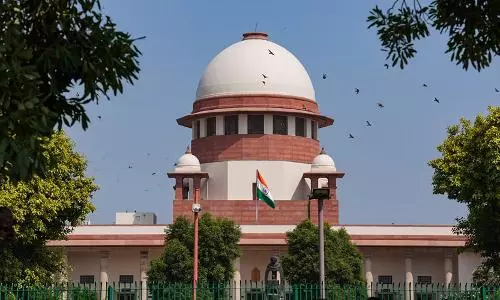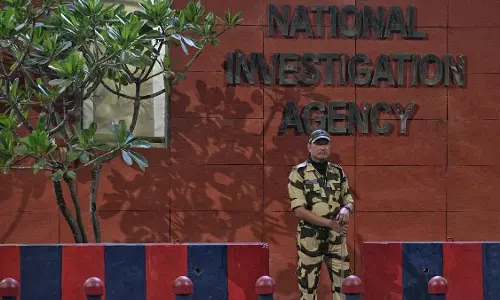
Towards Totalitarianism: from NJAC to Electoral Bonds
text_fieldsOn the terrace of the country’s democracy, an air towards a totalitarian regime has been blowing evident inchmeal. Under the current government, where the nation finds itself at a crossroads, promises of progress mingle with shadows of authoritarianism. As the world watches, the same tale unfolds of shifting power towards the quest for control over the spirit of the “basic structure”. By declaring unconstitutional the Electoral Bond Act of 2018, the Supreme Court's beacon of hope continues to flicker amidst the growing concerns of government overreach.
Recently, the Supreme Court struck down as unconstitutional the electoral bonds scheme for political funding, introduced by the Narendra Modi government. Many previous rulings of the apex court including the abrogation of Article 370, the Aadhaar case, Triple Talaq, the Ayodhya verdict, etc have favoured the government, but this ruling marks an instance of the Modi government's policy decisions being struck down by the court.
In recent years, the country has witnessed a concerning shift in its political landscape. The administration under Prime Minister Narendra Modi has been accused of gradually shifting away from democratic principles, inching closer towards a more rightwing authoritarian regime. Despite the hope of checks and balances through the constitutional courts existing, this transition raises crucial questions about the state of India's democratic institutions and the implications for its diverse populace.
National Judicial Appointment Committee
The NJAC Bill was introduced in Parliament in August 2014, shortly after the beginning of the Modi government's first term. The President approved it on August 15, 2014. Its objective was to replace the collegium system existing till then, for appointing judges with a panel consisting of the Prime Minister, the Leader of the Opposition, the Chief Justice of India, and two eminent individuals selected by the panel. The government contended that the NJAC would enhance transparency in the selection and transfer of judges. However, petitioners who challenged it in the court argued that the NJAC would excessively favour the Executive in the Judiciary. Advocates-on-record from the Supreme Court filed a petition against it, thus resulting in the quashing of the law in October 2015.
The quashed move was arguably a threat to the independence of the judiciary and could potentially compromise its ability to function as a neutral arbiter of justice. Judicial independence is a cornerstone of democracy, to ensure that the judges are free from external pressures when making decisions. The devious effort to allow the executive to have a larger say in judicial appointments was to erode this independence, so that judges may feel obedient and beholden to the government of the day that appointed them.
The existing collegium system, despite the criticisms against it, was designed to maintain a separation of powers between the judiciary and the executive. By replacing it with the NJAC, the balance of power could be disrupted, potentially leading to undue influence on judicial appointments. Nevertheless, the transparency of judicial appointments is still an objective to be achieved.
Aadhaar Case
In 2016, the Modi government introduced the Aadhaar scheme through legislation in the Lok Sabha, passing it as a Money Bill. This action was seen as an effort to sidestep the Rajya Sabha, where the NDA then lacked a majority, as the Upper House has limited authority over Money Bills. Congress leader Jairam Ramesh contested this decision in the Supreme Court in 2017, arguing against the classification of the Bill as a Money Bill. In January 2018, a five-judge Bench commenced hearings on the case, eventually affirming the law is constitutionally valid. However, the Court invalidated provisions that mandated linking Aadhaar to mobile phones and children's school admissions.
Appointments of Election Commissioners
In December 2023, the Centre introduced the Chief Election Commissioner and Other Election Commissioners (Appointment, Conditions of Service, and Term of Office) Bill in Parliament, which was subsequently passed despite the Opposition's walkout in the Lok Sabha. The Act stipulated that the three-member panel would be responsible for selecting the Chief Election Commissioner and Election Commissioners would consist of the Prime Minister, the Leader of the Opposition, and a Union Minister nominated by the prime minister. Previously, in the absence of a governing law, the verdict of a Supreme Court had decreed that the Chief Justice of India would be a part of this panel in the place of the prime minister. It was evident that the mere nature of the act itself gives supremacy to the government as the foremost constitutional body.
Congress leader Jaya Thakur challenged the Act in the Supreme Court. Recently, ahead of the panel's meeting to select the new Chief Election Commissioner, lawyer Prashant Bhushan filed a plea in the apex court seeking an interim stay on the law. However, the Supreme Court declined to grant a stay and indicated that the matter would be addressed during the hearing of Thakur's plea scheduled for April and tinkering with the law at this stage would create chaos in the scenario of a general election so close.
Citizenship Amendment Act
The CAA provides a path to Indian citizenship for Hindu, Sikh, Buddhist, Jain, Parsi, and Christian immigrants from three neighbouring countries, i.e. Pakistan, Bangladesh and Afghanistan, who faced persecution based on their religion. Notably, it excludes Muslims from its provisions, which has been a point of contention. Critics argued that the CAA violates the secular principles of the Indian Constitution by discriminating against Muslims and undermines the country's long-standing principle of secularism. They also express concerns about its potential to marginalize and disenfranchise Muslim minorities in India
This act also sparked significant controversy and led to legal challenges in India. As the publication of the Rules of the CAA coincided with the processes for holding the great election also in progress, the government order triggered widespread protests and debate across the country, mainly with concerns raised about its potential implications for secularism, inclusivity, and the rights of religious minorities. While the Supreme Court has not issued a final verdict on the Citizenship Amendment Act, the legal proceedings regarding the Act remain ongoing.
Electoral Bond Case
The act of 2017, allowed individuals and corporations to donate money to political parties anonymously through financial instruments called electoral bonds. These bonds could be purchased from authorized banks (SBI) and then deposited into the accounts of political parties without the donor's identity being disclosed. In the latest development in the electoral bonds case, the Supreme Court asked the SBI to disclose all conceivable details available, including the alphanumeric number corresponding to each bond. The court highlighted the right to information, the lack of transparency, and the potential for misuse of political funding through electoral bonds.
Critics say that the act whitewashed corruption as an “institutional corruption” through a veiled legal manner, and enabled the BJP-led government to acquire maximum benefits with the ‘carrot and stick’ policy by using the investigation agencies including the Enforcement Directorate (ED) and Central Bureau of Investigation (CBI), etc. Even though justice delays have significantly favoured the BJP-led government to strengthen its wings towards the upcoming poll battle, the Supreme Court has been able to uphold democracy to this extent.
The encroachment towards totalitarianism using sugar-coated methods poses a grave threat to the very essence of democracy. As the erosion of civil liberties continues, the stifling of dissent and the consolidation of power in the hands of a select few strengthen authoritarianism, it becomes imperative to reaffirm our commitment to the principles of freedom, justice, and democratic governance. When history serves as a stark reminder of the cursed era of authoritarianism, we must heed its lessons for the future. Only through unwavering commitment to democratic values can we fortify the bulwarks against the tide of tyranny and uphold the ideals that define us as a free and democratic society.
(Nabeel Kolothumthodi is the Parliamentary Associate to a Lok Sabha MP. Views expressed are personal)






















